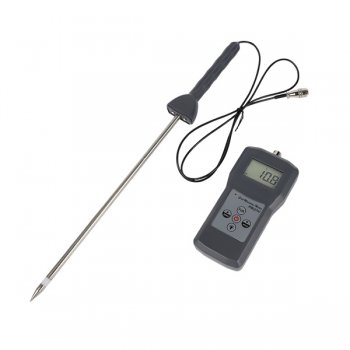Top 10 Benefits of Using a Moisture Meter for Correct Measurements in Your Home
Wiki Article
The Ultimate Overview to Wetness Meters: A Comprehensive Overview and Just How They Can Save You Money
Dampness meters serve as vital tools in identifying and keeping track of moisture material in materials, aiding in avoiding pricey problems and ensuring the high quality of items. Understanding the nuances of various kinds of dampness meters, their applications, and the potential cost-saving benefits they supply can be a game-changer for companies and specialists alike.Types of Wetness Meters
One common kind is the pin-type dampness meter, which gauges the electric resistance in between 2 pins put right into a product. Pinless wetness meters, on the other hand, use electro-magnetic sensing unit plates to scan a bigger location without causing damages to the material's surface.
Infrared wetness meters gauge the thermal buildings of a material to identify its dampness content non-invasively, making them valuable for applications where pin or pinless meters may not be appropriate. Recognizing the different types of wetness meters available can assist sectors choose the most suitable device for their specific moisture measurement requirements.

Advantages of Making Use Of Moisture Meters
Moisture meters offer indispensable advantages in accurately monitoring and assessing dampness levels in varied materials and atmospheres. One of the main advantages of utilizing wetness meters is the avoidance of potential damages triggered by excess wetness.
Moreover, utilizing moisture meters can cause raised power effectiveness. By identifying locations with high wetness levels, such as leakages or bad insulation, adjustments can be made to improve power conservation and reduce energy costs. In farming settings, moisture meters play a crucial duty in enhancing plant yields by enabling farmers to keep track of soil dampness levels and make educated irrigation choices. Generally, the benefits of utilizing moisture meters extend across numerous industries, providing economical solutions and promoting better quality assurance practices.
Just How to Select the Right Dampness Meter
Selecting the suitable dampness meter involves considering crucial factors such as material compatibility, dimension array, and calibration accuracy. When choosing a wetness meter, it's necessary to guarantee that the meter appropriates for the particular material you will certainly be screening. Various products have varying electric properties that can affect dampness readings, so choosing a meter made for your product is essential for precise outcomes. In addition, take into consideration the dimension variety of the moisture meter. Ensure that the meter can spot wetness levels within the variety required for your applications. Calibration accuracy is another vital element to remember. Select a wetness meter with reliable calibration to ensure precise and consistent analyses. Some meters may need periodic calibration adjustments, so understanding the calibration procedure is very important. By thoroughly reviewing these variables, you can select a wetness meter that meets your web link needs and gives exact wetness measurements for your projects.Appropriate Methods for Moisture Meter Use

Expense Cost Savings With Dampness Meter Applications
Just how can the critical use of dampness meters cause considerable expense savings throughout different markets? Wetness meters play a crucial duty in price financial savings by avoiding possible damages and making certain quality assurance in various industries. In the agriculture industry, moisture meters help in establishing the optimal time for harvesting plants, avoiding over-drying or excess moisture that can influence the last product's top quality. This exact monitoring aids farmers prevent unneeded losses and maximize their return.
In a similar way, in construction, wetness meters help stop costly damages by spotting dampness levels in building products, such as wood or concrete, which can bring about structural problems otherwise dealt with immediately. By identifying issue locations at an early stage, contractors can take restorative actions to avoid substantial fixings or replacements, eventually conserving time and cash.
Moreover, in the food handling industry, moisture meters are necessary for monitoring product high quality and making certain conformity with safety guidelines. By accurately measuring moisture material in foodstuff, makers can protect against spoilage, maintain freshness, and minimize waste, leading to substantial price financial savings. Overall, the strategic company website application of moisture meters is a valuable investment that can result in considerable expense decreases and enhanced effectiveness across different markets.
Final Thought
In final thought, moisture meters are beneficial tools for determining and detecting wetness levels in numerous materials. By making use of the best dampness meter and following correct methods, customers can successfully avoid costly problems created by excess wetness.Dampness meters serve as crucial tools in identifying and monitoring moisture material in products, aiding in protecting against expensive damages and ensuring the top quality of items. Infrared moisture meters determine the thermal homes of a product to establish its moisture content non-invasively, making them beneficial for applications where pin or pinless meters might not be suitable.Wetness meters use important advantages in properly keeping an eye on and analyzing moisture levels in diverse materials and settings. In farming setups, moisture meters play a vital duty in maximizing plant yields by enabling farmers to keep track of soil wetness degrees and make notified watering choices.In verdict, moisture meters are important devices for measuring and identifying moisture levels in various materials.
Report this wiki page